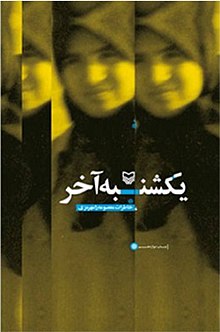Eternal Fragrance
 | |
| Author | Masoumeh Ramhormozi |
|---|---|
| Translator | Farahnaz Omidvar |
| Language | Persian, English, Arabic |
| Genre | Memoir |
| Publisher | Sureye Mehr Publication |
Publication date | 2003 |
| Publication place | Iran |
| Media type | Book |
| Pages | 242 |
| ISBN | 978-600-331-021-6 |
Eternal Fragrance (Template:Lang-fa, "Last Sunday") is a book written by Masoumeh Ramhormozi about the Iran–Iraq war (1980–88). Masoumeh, who was 14 at the time, was a social worker in a field hospital during the war. The English translation of The Last Sunday, titled Eternal Fragrance, was launched at the 66th Frankfurt Book Fair.[1]
Eternal Fragrance is Ramhormorzi's memoir about the war Iraq imposed on Iran; it was ranked the second book in the 9th Sacred Defense Book of the year awards. This book discusses some of the roles of Iranian women who participated in the Iran-Iraq war.[2]
According to critics, Eternal Fragrance is the most effective memoir of the Iran–Iraq war. It is one of the first published works about the Iranian women's roles during this period, which paved the way for the publication of similar works. The original book was translated into English by Farahnaz Omidvar.[3]
Background
Masoumeh Ramhormozi, a native of southern Iran, was 14 in 1980 when the Iran-Iraq war broke out. She was raised in a religious family who were active during and after the Iranian Revolution. Masoumeh was a social worker in a field hospital. Her brothers were killed in the war and she has said that moment was the hardest of the war for her. Ramhormozi had a notebook that wrote her memoirs for her own peace of mind, and sometimes tore them up.[4]
Narrative
Eternal Fragrance is mainly about the memories of Masoumeh Ramhormozi, a woman fighter whose father and brothers were killed during the Iran-Iraq war.[5] At the start of the book she states: "I wrote major event in note book everyday for peace of my heart and sometimes teared up my handwritten". She kept the notes and used them to write her memoirs and said, "I write [my] own memories today for reading with other people not for my heart".[6] This book consists of 12 chapters, a pictures gallery, and documents about major events during Iran-Iraq war.[citation needed]
Publication
The book was first published in Persian as The Last Sunday by Sureye Mehr Publication Company in 2003.[7] The original book was translated into English by Farahnaz Omidvar, and the English translation was later sent to England for editing.[3] The English version, titled, Eternal Fragrance, was launched at the 66th Frankfurt Book Fair.[8]
See also
- Iran–Iraq War
- Liberation of Khorramshahr
- Battle of Khorramshahr
- Mohammad Jahanara
- Noureddin, Son of Iran
- One Woman's War: Da (Mother)
- Persepolis (banned in Iran)
- List of Iranian commanders in the Iran–Iraq War
- That Which That Orphan Saw
- Chess with the doomsday machine
- Fortune Told in Blood
References
- ^ "English & Arabic translation of The Last Sunday". Frankfurt Book Fair. 8 Oct 2014.
- ^ Staff writers. "Seyyedeh Zahra Hosseini's "Da" Has Reached To Its 100th Edition". raihaneh news. Retrieved 4 July 2014.
- ^ a b Staff writers (10 Oct 2014). "Female rescuer's diaries of war unveiled at Frankfurt Fair". Iran Book News Agency.
- ^ Staff writers (26 July 2014). "Unveiling of English and Arabic translation of Eternal Fragrance". Farsnews Agency.
- ^ "Introduction of Last Sunday book". Sooremehr Publisher.
- ^ Staff writers (2 Dec 2013). "Last Sunday a woman narrative from Iran-Iraq war". Shohadayeiran News Agency.
- ^ Staff writers (8 October 2014). "Unveiling of English translation of Last Sunday book in Frankfurt Book Fair". JAM News Agency.
- ^ Paul Lee (24 October 2013). "Series Book Tells about the Heaven and the New Jerusalem". Christian Telegraph.
